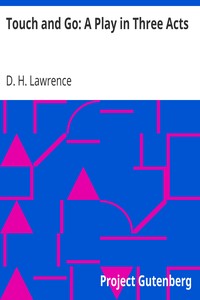| Author |
Lawrence, D. H. (David Herbert), 1885-1930 |
| Title |
Touch and Go: A Play in Three Acts
|
| Note |
Reading ease score: 87.0 (6th grade). Easy to read.
|
| Credits |
Produced by Douglas Levy, and David Widger
|
| Summary |
"Touch and Go: A Play in Three Acts" by D. H. Lawrence is a theatrical work crafted during the early 20th century, reflective of post-World War I sentiments. The play addresses the complexities of class struggle, particularly focusing on the dynamics between labor and capital within a mining community, and questions the essence of human identity beyond societal roles and expectations. The opening introduces a range of characters, including Gerald Barlow and Willie Houghton, who engage in a debate concerning freedom, contentment, and the plight of coal miners, setting the stage for conflicts centered around social justice and individual agency. At the start of the play, a gathering unfolds in the market-place of a Midlands mining village on a Sunday morning. Willie Houghton addresses a group of colliers, expressing frustration over their lack of awareness regarding their own freedom and future. He paints a grim picture of their potential fate as “numbered slaves” in a compound, igniting conversations about complacency and the need for collective action. Meanwhile, characters such as Gerald Barlow and Oliver Turton are introduced, creating interwoven relationships and dialogues that explore personal and socio-political themes. This opening sets a poignant tone, suggesting that underlying the everyday lives of these characters is a profound struggle for dignity and identity against the backdrop of industrialization and class conflict. (This is an automatically generated summary.)
|
| Language |
English |
| LoC Class |
PR: Language and Literatures: English literature
|
| Subject |
English drama
|
| Category |
Text |
| EBook-No. |
4216 |
| Release Date |
Jul 1, 2003 |
| Most Recently Updated |
Dec 26, 2012 |
| Copyright Status |
Public domain in the USA. |
| Downloads |
91 downloads in the last 30 days. |
|
Project Gutenberg eBooks are always free!
|

